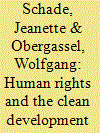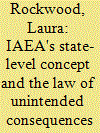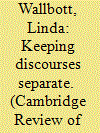| Srl | Item |
| 1 |
ID:
137155


|
|
|
|
|
| Summary/Abstract |
The 2010 UN climate conference in Cancún emphasized that ‘Parties should, in all climate change related actions, fully respect human rights’. However, so far there is no further guidance. This article discusses the relevant legal human rights norms and two case studies from the Kyoto Protocol's Clean Development Mechanism (CDM). The first case (Bajo Aguán, Honduras) shows that the current absence of any international safeguards can lead to registration of highly problematic projects. The second case (Olkaria, Kenya) suggests that safeguards, introduced here as a side effect of World Bank involvement, can have a positive impact, but that it is necessary to have them based on human rights. It therefore seems recommendable that the UN climate regime develop mandatory human rights safeguards. In addition or alternatively, individual buyer countries or groups of countries, such as the European Union, could introduce their own additional requirements for CDM projects
|
|
|
|
|
|
|
|
|
|
|
|
|
|
|
|
| 2 |
ID:
134085


|
|
|
|
|
| Publication |
2014.
|
| Summary/Abstract |
In September 2013, the International Atomic Energy Agency (IAEA) Board of Governors reviewed a report by Director-General Yukiya Amano on efforts to further strengthen the effectiveness of safeguards and increase their efficiency.[1] The report described an approach to the implementation of safeguards that had come to be known as the "state-level concept."
|
|
|
|
|
|
|
|
|
|
|
|
|
|
|
|
| 3 |
ID:
137156


|
|
|
|
|
| Summary/Abstract |
The Alliance of Small Island States (AOSIS) encompasses more than 40 low-lying and island developing states that are among the most vulnerable but also most vocal parties in international climate negotiations. Over the years AOSIS's strategies comprised of the building of scientific expertise, and leadership by example, but also a particular framing that puts emphasis on multilateral processes to deal with issues of common concern and established principles of the international community. The initial assumption of the paper is that a frame alignment of climate change and human rights concerns would strengthen the coalition's moral and legal arguments. However, as a frame analysis of close to 50 coalition submissions and statements reveals, such a linkage is not established. The paper concludes by outlining three possible explanatory factors for this observation: the nature of the issue area, the character of the coalition and the professional background of AOSIS negotiators.
|
|
|
|
|
|
|
|
|
|
|
|
|
|
|
|